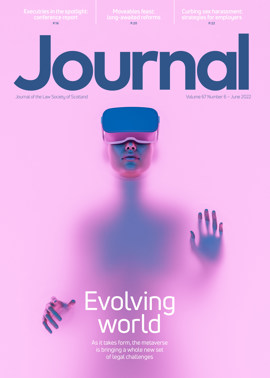Pride and progress
Throughout June, our friends and colleagues from across the legal profession turn up the colour to mark Pride month, which culminates this year in Pride weekend events that we will participate in together, side by side, for the first time since the pandemic.
Like so many aspects of post-pandemic life, this return to “normality” is also an opportunity for reflection: is our approach still the best one to take?
The Law Society of Scotland has conducted surveys into the profile of the profession since the turn of the century, and in the years between 2006 and 2010, the numbers of those in the profession identifying as lesbian, gay, bisexual and/or transgender remained static.
In more recent years, however, that percentage identifying as part of the LGBTQ+ community is increasing. In the most recent Profile of the Profession survey from 2018, the number rose to 5%, from around 3% in 2006.
The trend is especially apparent among younger lawyers. In the data collected as part of the 2020-21 practising certificate renewal, solicitors under 30 were almost twice as likely to identify as LGBTQ+ compared to the overall responses. While these figures are still lower than the Scottish average as a whole – estimated in recent years by LGBTQ+ charity Stonewall to be around 5-7% of the population – the increase in representation paints a picture of steady progress.
Attitudes changing
Anecdotally, though, LGBTQ+ colleagues appear underrepresented at senior levels of Scotland's law firms, and more role models at leadership level would be desirable. Drawing on her experience with over 35 years in the law, including in roles dedicated to improving diversity and inclusion across the profession, Yvonne Brady, head of Strategy, Restructuring & Insolvency at Morton Fraser, recalls attending firm functions in the 1980s as the partner of a close friend who felt it would have been prejudicial to his career to take along his boyfriend.
She says: "There were automatic assumptions in the profession at that time that couples would comprise a boyfriend and girlfriend or a husband and wife and nothing beyond that. Indeed invitations would have been extended based on that premise and I do not recollect ever being at a formal event where any of the friends or colleagues that I had who in their private lives were entirely open about their sexuality and happy to socialise in a non-business context would have brought along their same sex partner. I do not think that attitude prevails now."
Elaine MacGlone, Equality and Diversity manager at the Law Society of Scotland, agrees: "It is sobering to think that until 1981 Scots law criminalised homosexual activities between consenting adults, and little wonder therefore that gay people in the legal profession at that time felt they had to conceal who they really were. Society has certainly moved on since those days, and that includes the legal profession, as well as the Law Society itself. We have made it a priority to lead by example.
"The best feedback we’ve had is from an LGBTQ+ member who commented on the progress we’ve made. When they entered the profession, they could never have imagined the Law Society participating in and supporting Pride events, and were delighted to see we were doing so. That said, as our first openly LGBTQ+ President, Amanda Millar reminds us, there is still much to do."
Further steps
Assuming junior solicitors follow the traditional path to partnership, will they still be comfortable being themselves in the workplace as they progress through their career? We would hope so, but the Law Society of Scotland's data indicates that for many, the workplace is not always a welcoming environment to develop in. LGBTQ+ colleagues are at a significantly higher risk of experiencing harassment in the workplace, with a full one-third of those who identified as LGBTQ+ reporting to have experienced bullying, harassment or sexual harassment in the workplace, compared to 27% of heterosexual respondents.
The data also suggest that the progress made for lesbians, gay men and bisexual colleagues is not being matched for our friends and fellow professionals from other sections of the rainbow community, including those who identify as transgender. In the 2018 study, fewer than half of those respondents (41%) said they would feel comfortable about being open at work about their gender identity.
While the profession's focus is on Pride, we ought to reflect on these data and reaffirm our commitment to making our organisations and workplaces more inclusive. Beyond the mandatory anti-bias training that many firms now employ, there is value in continuing to create platforms for discussions to be shared about the lived experiences of those in the LGBTQ+ community.
Brady re-emphasises the importance of staving off complacency, and ensuring we continue to focus on true inclusion. She recalls the message shared by one of her colleagues: "When I am faced with someone who says they ‘don’t care’ if I am gay I always find it disappointing, as I want them to care. It is only if they care that they will actually take steps to ensure that I am encouraged to develop and progress, whatever my sexuality."
We will continue to join with our friends and fellow professionals in taking the vital steps to be a more inclusive profession and society, and creating a place where everyone belongs, even after the Pride flags come down for another year.
Perspectives
Features
Briefings
- Criminal court: Hunted within the law?
- Corporate: The Register of Overseas Entities
- Intellectual property: A new era for the internet
- Agriculture: Tenant gives notice then pleads for stay
- Succession: Challenging valuations
- Sport: FIFA guide boosts women’s football
- Property: Property lawyers unite!
- Data protection: Privacy– recent enforcement highlights
- In-house: From Windrush to Waltham Forest






